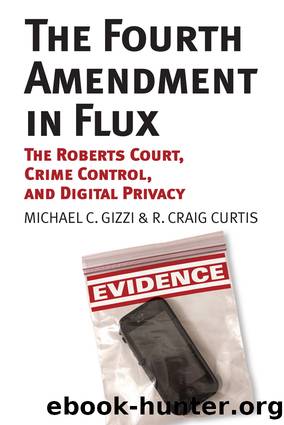The Fourth Amendment in Flux by Michael C. Gizzi & R. Craig Curtis

Author:Michael C. Gizzi & R. Craig Curtis [Gizzi & Curtis]
Language: eng
Format: epub
ISBN: 9780700622580
Publisher: University Press of Kansas
Published: 2016-04-22T00:00:00+00:00
Riley v. California: A Sweeping Endorsement of Digital Privacy
We began this book with a description of the facts of Riley v. California, contrasting the decision with the Court’s ruling in Maryland v. King. Riley held that police needed a warrant to search a cell phone incident to arrest, whereas in Maryland v. King, there is no privacy interest preventing police from collecting DNA samples from arrestees to create a database to be used in other cases. The two decisions illustrated the tension implicit in Fourth Amendment analysis today. In many ways, Riley was a far bigger test for the future of Fourth Amendment privacy analysis than Jones. Cell phones, and smartphones in particular, are an essential part of everyday life in the twenty-first century. Police searches of phones are not limited to just identifying a list of numbers called, and can potentially include the content of text messages, photographs, emails, videos, Internet search histories, and more. Perhaps most importantly, while the police place GPS devices only on the vehicles of people they have reason to believe are engaged in criminal behavior, criminals and law-abiding citizens alike carry cell phones. Therefore, protecting the rights of the criminal defendants with regard to their cell phones serves the interest of protecting the privacy of millions of innocent citizens in ways that few other types of cases can.
The search incident to arrest doctrine permits a search of the arrestee’s person and the area within their immediate control. In recent years, police had made it common practice in conducting such searches to scroll through the content of cell phones that were on the persons of arrestees, particularly in drug cases. The combined cases of Riley v. California and United States v. Wurie involved just that scenario. David Riley was stopped for a minor traffic violation. He was arrested for driving under a suspended license. His car was impounded, and an inventory search uncovered guns. A search of his person incident to arrest included his Samsung smartphone, which uncovered evidence of gang activity in his text messages, pictures, and videos. Brima Wurie was arrested after police observed him engaged in a drug deal. Police searched his cell phone, a more traditional “flip phone,” and scrolled through his call log, and saw numerous calls to “my house.” The officer identified the number, traced it to Wurie’s apartment, and obtained a search warrant for the apartment, where drugs were found. Both cases raised the question of whether a search of the cell phone incident to arrest was a violation of the Fourth Amendment. Riley’s motion to suppress was denied, and his conviction was affirmed on appeal. Wurie’s motion to suppress was also denied, but unlike Riley’s, his appeal to the court of appeals was successful.
In many ways, the decision to hear the two cell phone cases sent a signal that the Court was willing to take the next step and flesh out some of the unanswered questions raised by Jones. The direction the Court would take, however, remained uncertain.
Download
This site does not store any files on its server. We only index and link to content provided by other sites. Please contact the content providers to delete copyright contents if any and email us, we'll remove relevant links or contents immediately.
The Secret History by Donna Tartt(18053)
The Social Justice Warrior Handbook by Lisa De Pasquale(11930)
Thirteen Reasons Why by Jay Asher(8397)
This Is How You Lose Her by Junot Diaz(6401)
Weapons of Math Destruction by Cathy O'Neil(5779)
Zero to One by Peter Thiel(5443)
Beartown by Fredrik Backman(5293)
The Myth of the Strong Leader by Archie Brown(5204)
The Fire Next Time by James Baldwin(4985)
How Democracies Die by Steven Levitsky & Daniel Ziblatt(4931)
Promise Me, Dad by Joe Biden(4890)
Stone's Rules by Roger Stone(4818)
100 Deadly Skills by Clint Emerson(4647)
Rise and Kill First by Ronen Bergman(4525)
A Higher Loyalty: Truth, Lies, and Leadership by James Comey(4520)
The David Icke Guide to the Global Conspiracy (and how to end it) by David Icke(4348)
Secrecy World by Jake Bernstein(4342)
The Farm by Tom Rob Smith(4294)
The Doomsday Machine by Daniel Ellsberg(4220)
